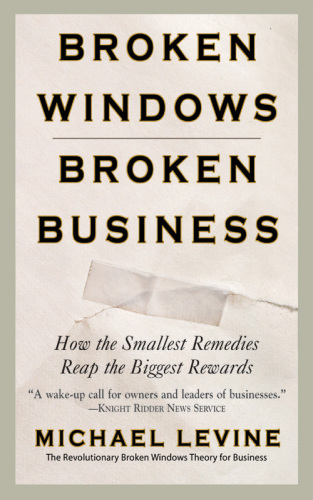
Broken Windows, Broken Business
How the Smallest Remedies Reap the Biggest Rewards
کتاب های مرتبط
- اطلاعات
- نقد و بررسی
- دیدگاه کاربران
نقد و بررسی

August 29, 2005
Law-and-order criminology inspires this dour, hectoring treatise on the importance of sweating the small stuff in business. PR executive Levine, author of Guerrilla P.R.
, combines his professional concern for detailed image control with James Q. Wilson and George L. Kelling's theory that minor signs of disorder foster a climate of insecurity that causes decent folk to flee. He contends that a company's metaphorical "broken windows"—a confusing Web site, messy restrooms, peeling paint, nagging inconsistencies like "when the waiter at a Chinese restaurant is named Billy Bob"—signal an indifference to consumer satisfaction that repels customers. His remedies are fairly routine: deploy mystery shoppers to ferret out shortcomings, remember that first impressions are lasting, strive to "exceed expectations." What's unusual is his fanaticism, his demands that businesspeople cultivate "the obsessive, compulsive, almost violent need to find the flaws," even when others "deny such things exist or insist that they are unimportant and that you are being ridiculous." Such denials may indicate that "more employees should be getting fired," particularly those who don't smile or are otherwise "coasting, doing their time, merely existing" and infecting other workers with their "virus." Levine is one hard-nosed beat cop, but his strident, repetitive style and emotionally insensitive methods mean that many readers (and certainly their underlings) will find the book more demoralizing than motivating. Agent, Craig Nelson.

October 15, 2005
In March 1982, criminologists James Q. Wilson and George L. Kelling introduced the "broken windows" theory, which says that upkeep and reduction of petty crimes such as graffiti enhance the livability of a place and reduce the incidence of more violent crimes. Most law-enforcement experts balked at the time, but the theory was borne out in places like New York City, where Rudolph Giuliani put it into practice in the 1990s. Levine applies the same theory to business, where that same attention to detail can be the difference between failure and success. The "broken windows" that turn customers away could be as simple as poorly maintained restrooms, but more likely it's the customer service problems that slowly degrade a business over time. Levine reminds us that most customers will not even bother to complain when they're unhappy; they simply walk away. He makes his strongest case with the airline industry, buckling under massive failure because they've taken their customers for granted for so long. The examples ring true and the fundamentals apply to any size business.(Reprinted with permission of Booklist, copyright 2005, American Library Association.)

























دیدگاه کاربران